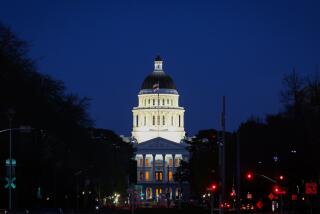State leaders fail to reach water accord
Gov. Arnold Schwarzenegger and state legislative leaders broke off talks Friday evening without a deal on upgrading California’s water supply and with a looming threat by the governor to veto many of the bills sitting on his desk if there is no agreement by Sunday.
Even as the leaders debated asking voters to approve billions of dollars in new debt to strengthen the state’s water resources, a top finance official warned that government revenue is already $1 billion short of the amount needed to balance the budget that was passed in the face of a significant deficit less than three months ago.
Those complications arose as the governor maintained a threat to veto 700 bills that lawmakers approved near the end of the legislative session last month. Schwarzenegger and his aides made the threat in an attempt to use bills as leverage in the water talks.
The governor has until midnight Sunday to sign or veto the measures, or they automatically become law.
When negotiations broke up early Friday evening, Assembly GOP leader Sam Blakeslee of San Luis Obispo said that “a dozen or more major issues” were unresolved.
Senate leader Darrell Steinberg (D-Sacramento) said there had been progress, but he told reporters that disagreements persisted over how much would need to be borrowed to implement any water plan and about the makeup and funding of a council to address management of the Sacramento-San Joaquin Delta.
Schwarzenegger’s spokesman, Aaron McLear, said that negotiations would continue this afternoon and that the governor would carry out his veto threat if meetings did not produce a deal or something close to one.
Schwarzenegger had continued to pressure the legislators Friday, appearing on the Capitol steps with the Latino Water Coalition, an advocacy group. The governor said he and the lawmakers were “on the verge of a historic breakthrough on water” but were not there yet.
“I thank that all of you are here today to give the legislators this extra little push that they need to get across the finish line,” Schwarzenegger said. “And if they need a little bit more, then you are even ready to give them that hard shove to get across the finish line.”
As the ralliers cheered, the governor yelled, “We are going to get it done today!”
Lawmakers taking part in the talks said there was consensus that the $12 billion in general obligation bonds proposed by Democratic leaders in September was too much to win the two-thirds approval needed in the Legislature.
But trimming the borrowing back to $8 billion, as some participants have suggested, for delta restoration and new water storage would cut funding for regional projects such as recycling and groundwater cleanup. That could whittle support for the measure.
Borrowing would also need approval from voters, who may be wary if state finances do not improve. Controller John Chiang reported Friday that income tax receipts have fallen 11% below what lawmakers and Schwarzenegger expected when they agreed to a patchwork budget plan during the summer. Sales and corporate taxes have also slid below expectations.
“The recession continues to drag state revenues down,” Chiang said in a statement.
Policymakers were already bracing for a big budget deficit next year. The Department of Finance has projected a $7.4-billion deficit in 2010-11 -- a conservative estimate, as lawsuits have either tied up or reversed some planned budget cuts.
Finances are not the only sticking point in a water deal. Bay Area water agencies are seeking protections -- opposed by environmentalists -- against the loss of some of their delta supplies. Protecting the delta ecosystem could require keeping more water there.
And an agreement could help pave the way for a canal to divert water from the Sacramento River around the delta to pumps that would send it to San Joaquin Valley farms and Southern California cities.
“Northern California is going to be served as the turkey at the celebratory dinner” if the water legislation passes as written, complained Randy Kanouse of the East Bay Municipal Utility District.
Agricultural interests that pump groundwater don’t like a proposed requirement for statewide monitoring of groundwater usage. And Central Valley lawmakers representing areas with some of the highest urban water use in California are trying to weaken a mandate to cut the state’s per capita water use by 20%.
Environmentalists have warned that if those provisions are weakened too much, they will balk.
State lawmakers, meanwhile, anxiously awaited the fate of their legislation. Assembly Majority Leader Alberto Torrico (D-Newark) accused the governor on Thursday of “coming perilously close to extortion” and committing a crime by linking his review of pending bills to a water deal.
But on Friday, state Atty. Gen. Jerry Brown, also a Democrat, largely dismissed that claim in a letter to Torrico and state Sen. Jeff Denham (R-Atwater).
Brown, a former governor of California who is campaigning to get that job back, did not offer an official legal opinion. He suggested, however, that horse-trading is normal in the governing process and called the veto “a powerful weapon for shaping policy.”
“Compromise in the rough-and-tumble legislative process,” Brown said, “is not achieved by doilies and tea.”
--
bettina.boxall@latimes.com
Times staff writers Shane Goldmacher and Patrick McGreevy contributed to this report.
More to Read
Get the L.A. Times Politics newsletter
Deeply reported insights into legislation, politics and policy from Sacramento, Washington and beyond. In your inbox three times per week.
You may occasionally receive promotional content from the Los Angeles Times.











